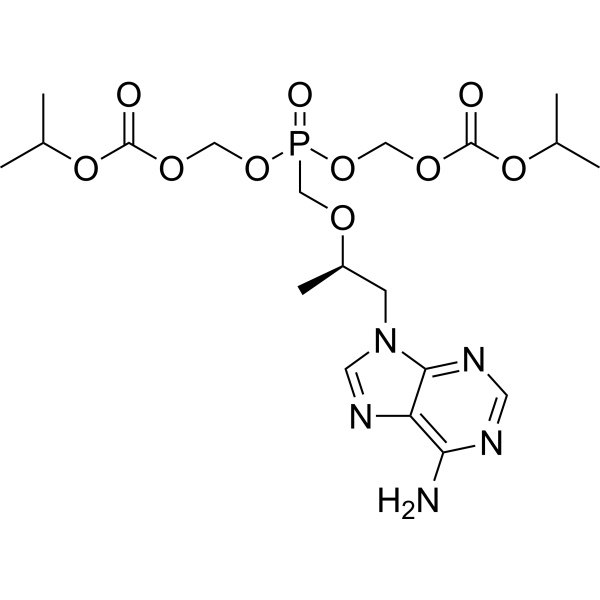Home
Products
Tenofovir disoproxil



| Product Name | Tenofovir disoproxil |
| Price: | Inquiry |
| Catalog No.: | CN06684 |
| CAS No.: | 201341-05-1 |
| Molecular Formula: | C19H30N5O10P |
| Molecular Weight: | 519.44 g/mol |
| Purity: | >=98% |
| Type of Compound: | Miscellaneous |
| Physical Desc.: | Powder |
| Source: | |
| Solvent: | DMSO, Pyridine, Methanol, Ethanol, etc. |
| SMILES: | C[C@H](Cn1cnc2c1ncnc2N)OCP(=O)(OCOC(=O)OC(C)C)OCOC(=O)OC(C)C |
| Contact us | |
|---|---|
| First Name: | |
| Last Name: | |
| E-mail: | |
| Question: | |
| Description | Tenofovir dsoproxil is a nucleotide reverse transcriptase inhibitor to treat HIV and chronic Hepatitis B. |
| In Vitro | Tenofovir shows cytotoxic effects on cell viability in HK-2 cells, with IC50 values of 9.21 and 2.77 μM at 48 and 72 h in MTT assay, respectively. Tenofovir diminishes ATP levels in HK-2 cells. Tenofovir (3.0 to 28.8 μM) increases oxidative stress and protein carbonylation in HK-2 cells. Furthermore, Tenofovir induces apoptosis in HK-2 cells, and that apoptosis is induced via mitochondrial damage[1]. Tenofovir and M48U1 formulated in 0.25% HEC each inhibits the replication of both R5-tropic HIV-1BaL and X4-tropic HIV-1IIIb in activated PBMCs, and inhibits several laboratory strains and patient-derived HIV-1 isolates. The combined formulation of M48U1 and tenofovir in 0.25% HEC exhibits synergistic antiretroviral activity against infection with R5-tropic HIV-1BaL, and is not toxic to PBMCs[2]. |
| In Vivo | Tenofovir Disoproxil Fumarate (20, 50, 140, or 300 mg/kg) administered to BLT mice, shows dose dependent activity during vaginal HIV challenge in BLT humanized mice. Tenofovir Disoproxil Fumarate (50, 140, 300 mg/kg) significantly reduces HIV transmission in BLT mice[3]. Tenofovir Disoproxil Fumarate (0.5, 1.5, or 5.0 mg/kg/day, p.o.) induces a dose-dependent decline in serum viremia in woodchucks chronically infected with WHV. Tenofovir Disoproxil Fumarate administration is safe and effective in the woodchuck model of chronic HBV infection[4]. |
| Cell Assay | Cells are plated into 48-well tissue culture plates (39,000 cells/mL) and allowed to grow for 48 h followed by treatment with vehicle or Tenofovir. Following the treatment period, cell viability is assessed using the MTT assay. The MTT assay relies on the conversion of tetrazolium dye 3-(4,5-dimethlthiazol-2-yl)-2,5-diphenyltetrazolium bromide (MTT) to formazan by NAD(P)H-dependent oxidoreductases. |
| Animal Admin | Twenty adult chronic WHV carrier woodchucks are stratified equally by age, sex, body weight, and serum GGT activity into five treatment groups consisting of four animals each: (i) Tenofovir Disoproxil Fumarate at 15.0 mg/kg once per day, (ii) Tenofovir Disoproxil Fumarate at 5.0 mg/kg/day, (iii) Tenofovir Disoproxil Fumarate at 1.5 mg/kg/day, (iv) Tenofovir Disoproxil Fumarate at 0.5 mg/kg/day, and (v) a placebo control. The woodchucks are treated daily for 4 weeks and observed for an additional 12 weeks following cessation of drug treatment. |
| Density | 1.5±0.1 g/cm3 |
| Boiling Point | 642.7±65.0 °C at 760 mmHg |
| Flash Point | 342.5±34.3 °C |
| Exact Mass | 519.173035 |
| PSA | 195.25000 |
| LogP | 2.04 |
| Vapour Pressure | 0.0±1.9 mmHg at 25°C |
| Storage condition | -20°C |